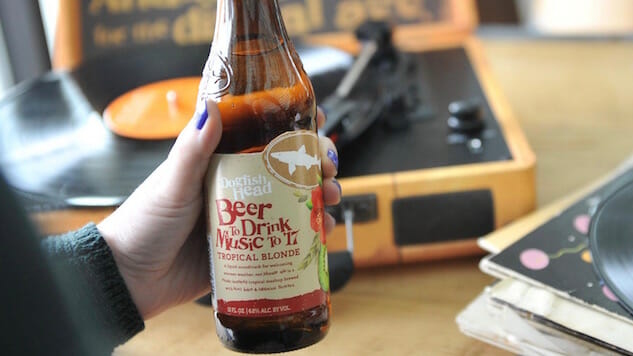Sonic Seasoning: How Music Changes the Taste of Your Beer
Photo via Dogfish Head
If you’re cracking open a classically bitter ale tonight, science suggests that you should couple it with the sultry sounds of Barry White if you really want to bring out the bitterness. Recent research that beer-drinkers find their brews more bitter if they are consumed while listening to low-pitch notes, and sweeter when coupled with higher pitch tones, like those of a flute or piano. The study forms part of a growing field of research called crossmodal perception or “sonic seasoning” and it could lead to your favorite six-pack being sold with a soundtrack in the future to help enhance the flavor.
The idea that sound can influence our perception of taste has been around for some time. More than 50 years ago, psychologist Kristian Holt-Hansen was serving Carlsberg Lagers to study subjects and asking them to pair the taste with the perfect pitch. Despite some interesting findings, his pioneering research was not robust enough to be taken seriously, and perhaps the world wasn’t quite ready for fine-tuned food. Fast-forward to 2017, and we have an army of digitally refined, smart phone-wielding Millennials eager for multisensory experiences.
Recently there has been a surge of studies that show more than just anecdotal evidence for the power of sound to influence our taste buds. “The approach we see today is much more rigorous scientifically and also very creative,” explains Professor Charles Spence, head of the Crossmodal Research Laboratory at the University of Oxford. ”While Holt-Hansen had nothing more than a tone generator, now we have sound designers and composers creating music for taste.”
Belgian PhD candidate Felipe Reinoso Carvalho is one such sound designer. In one of his studies published last year, Carvalho experimented with asking test subjects to rate a beer’s taste while listening to a specially selected soundtrack. Participants first rated the beer’s flavor without a backing track and then, unbeknownst to them, they rated the exact same beer again, only this time they were listening to beer-flavoring tones.
-

-

-

-

-

-

-

-

-

-

-

-

-

-

-

-

-

-

-

-

-

-

-

-

-

-

-

-

-

-

-

-

-

-

-

-

-

-

-

-








































